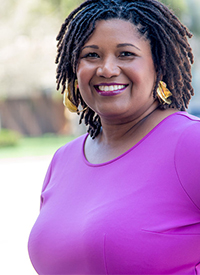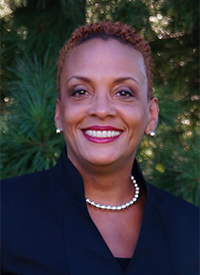by Pamela Ross, CICF vice president of opportunity, equity and inclusion
and Tamara Winfrey-Harris, CICF vice president of community leadership and effective philanthropy

Tamara Winfrey-Harris

Pamela Ross
As CICF began to better to understand the profound achievement and opportunity gap holding people back in our community, we knew it was time to change. We didn’t know exactly what to do or how to do it, but something had to be done. We had to take a hard look at ourselves; listen, learn and be willing to make mistakes along the way.
Two years ago, we embarked on a journey to become an anti-racist, inclusive and multicultural organization. We have a new mission – to mobilize people, ideas and investments to make this a community where all individuals have equitable opportunity to reach their full potential – no matter place, race or identity. And on April 11, we announced five community leadership initiatives that will guide this generational work in Marion County over the next five years.
We often get asked, “How? How did you get here?” Truthfully, we’ve never had a blueprint or checklist, and we never will. We’ve learned a lot along the way. We’ve learned that relationships are at the heart of this work, and that it demands authenticity and transparency. And we have a lot left to learn.
Here are 10 lessons we’ve learned so far:
1. Get Smart
When we started on this journey, we simply did not know enough to make meaningful, significant change. If we had immediately tried to craft a new strategic plan in 2016, it would not be as well-informed as it is today. We had a lot to learn. Our early work included co-founding the Community Foundation Opportunity Network (CFON), a collaborative of foundations inspired by Dr. Robert Putnam’s book “Our Kids.” The goal is to tackle issues of equity, opportunity and the achievement gap. Through the Undoing Racism Workshop and CICF’s racial equity consultant, Bob Hoffman, we’ve had external educators and guides walking alongside us and holding us accountable as we learn the history of racist institutions and systems in America and right here in Central Indiana. We talked with experts in the field and experts in our community; read books, articles and local and national studies to better understand how we might begin to make lasting change.
2. Engage the Community
Engaging the community is imperative. What CICF is doing sets us apart from most foundations and institutions historically governed from a predominantly white perspective. We have taken the stance that power must be shared between institutions and the community residents they serve. We’ve learned the value of doing things with the community, not to the community. This came directly from the findings of 36 community ambassadors, who were tasked with uncovering both the needs and the assets of their communities. Our ambassadors continue to show us the value of relationships with residents in neighborhoods, which helps hold ourselves accountable to people, not just to statistics.
3. Get Real
Conversations about race and racism are not easy. Our society is conditioned to not talk about race, especially in the workplace. But hard conversations are necessary to get at the root of what’s holding people back. We’ve heard from not-for-profit leaders that CICF’s willingness to talk openly about race enables them to talk about the impact of race in their work, too. We’ve worked to create safe and brave spaces – both internally and externally – to have important and difficult conversations around these topics. We do not and will not sugar coat anything.
4. Lead Boldly
Leadership matters. A tentative leader breeds tentative strategy, yet boldness begets boldness. We could not be on this journey without the bold leadership of our board and executive team, including their commitment to hire CICF’s first vice president of opportunity, equity and inclusion, to focus on our internal practices, processes and policies. We must change inside before we can change outside; we have a responsibility to our staff and this community to “walk our talk.” We will continue to use bold language: racism, white power, shared power – to name a few. We will call out racism when and where we see it in clear, unambiguous language. No matter if we’re talking to a neighborhood resident, fund-holder or not-for-profit organization, our community needs to know we are authentic and serious about this work.
5. Look Inside First
Before we could work to create empowering environments and dismantle systemic racism in our community, we had to look internally at our own racist past and practices. We are led by the “Five A’s”, a continuous process of learning and growing to become anti-racist, developed by CICF’s equity consultant, Bob Hoffman: Awareness, understanding the conscious and unconscious ways we participate in institutional racism; acceptance, accepting the roles we play in maintaining institutional racism; accountability, taking responsibility to shift the paradigm; alignment, focusing our personal and collective energy to solving the problem; and action, the visible strategies and behaviors that make a difference.
6. Change Your DNA
We have changed our organization’s DNA in order to fully embrace this work. We continue to think critically about several questions: Who are we partnering with? Do they embrace equity? Do we have the right people with the right perspectives on our staff and boards? Who gets access to our time and other resources? How do hiring practices change through an equity and inclusion lens? These questions fuel all of our operations – they are the fabric of who we are and who we strive to be.
7. Measure Up
Before embarking on our strategic plan, it was imperative to identify when and how we will know if we are successful. Conversely, it will perhaps be more important to know when we are not successful and need to change course. We knew we needed ways to measure our work by metrics of how well, how much, and who is better off. We promoted Laurie Burns to be CICF’s full-time community impact officer. She is training and equipping staff to use a results-based accountability model. This measures our impact and aligns our grant guidelines in a way that allows us to assess and report impact more effectively. This holds CICF to the same reporting standards as we hold our grantees.
8. Message Wisely
It’s okay to say, “We don’t know.” A big part of this journey has been accepting and acknowledging that we aren’t experts and must continue to learn and grow. Even with a communications plan and message training for staff, we continue to adapt the way we talk about our work and reflect on what we’ve learned. We continue to emphasize that messaging is not just something to memorize, but rather a tool that guides how our staff, board and partners talk about our work, in their own words. And as we learn, we grow, shift and get better.
9. Share Your Learning
Throughout this journey, we’ve called on others to help guide us. Although our work is imperfect and our journey is far from over, we have to be there to share what we’ve learned when others call on us. But we are honest in our conversations. We can’t tell you precisely what to do because – even though we know significantly more than we did two years ago – we are still learning, growing and doing the work.
10. Be Humble
We are not experts. We will mess up sometimes. We have taken bold steps toward important work, but there is much we still do not know. Our core values are that we must learn, partner and grow continuously. We must, as president and CEO Brian Payne says, “Show up and shut up.”
These 10 lessons are reflections on our journey thus far. We’ve come a long way but there’s still a lot we don’t know. If you embark on this journey, there will be things you don’t know, too. You must be willing to do the work to educate yourself. Our commitment to this community is to be present and listen, for as long as it takes.






Great message.